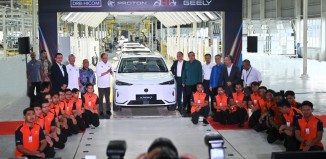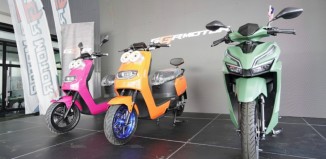Harley-Davidson Wins 2020 Altair Enlighten Award For Livewire

The Harley-Davidson Motor Company has been awarded the 2020 Altair Enlighten Award for its Livewire electrification effort. The win is in the Full Vehicle category of the 8th Annual Englighten Awards presented jointly by the Center for Automotive Research (CAR) and Altair. The awards recognise the world’s best initiatives to reduce vehicle weight and meet emissions targets, inspiring breakthrough advancements that push towards a more sustainable future.

“As we sit at the crossroads of science, engineering, art, and design, creating a more sustainable future is the essence of Altair as we are a pioneer in lightweighting technologies and methodologies,” said James Scapa, founder and chief executive officer of Altair. “I am proud to see that the Altair Enlighten Awards have become a sought-after recognition that acknowledges the world’s greatest automotive lightweighting innovations, while inspiring interest from industries, engineers, policymakers, educators, students, and the public.”
Altair is a global technology company which provides solutions in product development, high-performance computing (HPC), and data analytics.
Full Vehicle award winner, Harley Davidson, utilised electrification to improve the energy capacity of its Livewire electric motorcycle by 90%. This improvement also increased the ratio of energy capacity to vehicle mass by 60%. In addition to further improvements, this initiative established mass and stiffness design and optimization practices for future motorcycle programs.
 The runner-up in this category is Nissan, which gained recognition for its 2020 Sentra platform (the Sylphy equivalent). Its design dramatically improves safety and dynamic performance without increasing weight. This was achieved by using simulation to place the right materials in the right locations.
The runner-up in this category is Nissan, which gained recognition for its 2020 Sentra platform (the Sylphy equivalent). Its design dramatically improves safety and dynamic performance without increasing weight. This was achieved by using simulation to place the right materials in the right locations.
“We are proud to offer the automotive industry’s only award dedicated to vehicle lightweighting and are thrilled to see how many advancements are made through the use of optimization technologies,” said Richard Yen, Altair senior vice president, global industry verticals. “Each year the entries are more and more impressive, making it increasingly difficult to select the winners as entrants are making great strides in lightweighting, and using inventive approaches through simulation and materials.”
 “Design optimization is critical for every new product in the automotive industry and lightweighting is a key component. We are honored to collaborate with Altair in acknowledging these design innovations in the automotive sector,” said Carla Bailo, president and chief executive officer at CAR. “CAR’s multidisciplinary approach gives us a clear viewpoint on critical issues facing the global automotive industry and it is thrilling to see advancements in lightweighting making an immediate impact.”
“Design optimization is critical for every new product in the automotive industry and lightweighting is a key component. We are honored to collaborate with Altair in acknowledging these design innovations in the automotive sector,” said Carla Bailo, president and chief executive officer at CAR. “CAR’s multidisciplinary approach gives us a clear viewpoint on critical issues facing the global automotive industry and it is thrilling to see advancements in lightweighting making an immediate impact.”
The other winners recognised for their commercial automotive lightweighting achievements and technologies are:
- Module category winner: Toyota created a freestanding two occupant injection molded back-frame with no molded reinforcement for the 2021 Sienna. An industry first, it consolidated 15 components to one part with one injection. This drives down costs by 15%, reduces mass by 30% and improves safety performance by two times.
- Category Runner-up: ZF created the first-to-market electric park brake (EPB) with more than 75 million vehicles fitted with EPB for world roadways. The Heavy Duty EPB offers a weight savings of 25 lbs (11 kg) or more for large trucks and SUVs when compared to conventional drum-in-hat park brakes.
- Enabling Technology category winner: Mubea developed a glass fiber-reinforced polymer (GFRP) Tension Leaf Spring with weight savings of up to 75% compared to a standard multi-layer steel spring. The company used a scripted and automated workflow that begins from a parametrized spring model in which all spring parameters can be adapted.
- Category Runner-up: DuPont’s BETASEAL bonded thermoplastic liftgates, for its use of BETASEAL X2500 structural adhesive, which quickly joins thermoplastic inner and outer panels and enables modular lightweight assembly. The company’s Magna thermoplastic liftgates bonded with BETASEAL X2500 structural adhesive have realized a 20% – 30% weight savings compared to welded steel liftgates.
- Honorable mention: Mazda’s computer-aided engineering (CAE) multi-disciplinary design optimization (MDO) methodology captures top technology trends by applying simulation-driven design and data analytics for product design.
- Future of Lightweighting category winner: Marelli developed a new advanced sheet compression molded suspension steering knuckle that ensures a 25% mass savings compared to the aluminum version used on the Jeep Compass and a 50% savings compared to the cast iron version.
- Category Runner-up: Nissan’s ultimate lightweight aluminum/carbon fiber reinforced polymer (CFRP) body side panel using topology design reduced weight by utilizing a multi-material structure of aluminum and short fiber carbon fiber reinforced thermal plastic (CFRTP). Compared to conventional steel body side panels, it can reduce weight by approximately 50%.
For more information on the Enlighten Award, please visit https://www.altair.com/enlighten-award/.

























